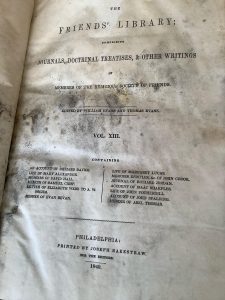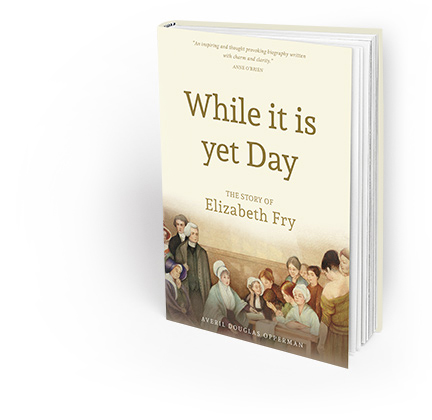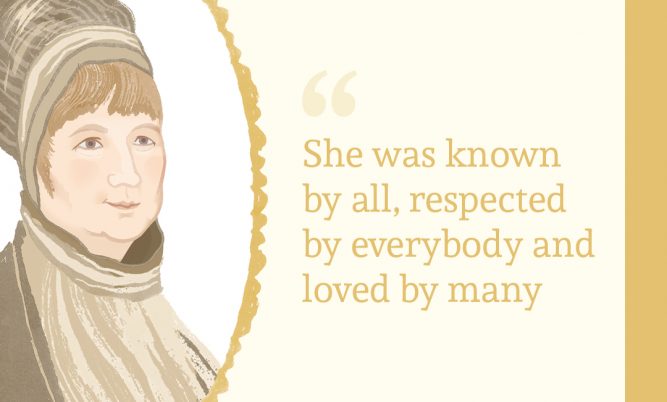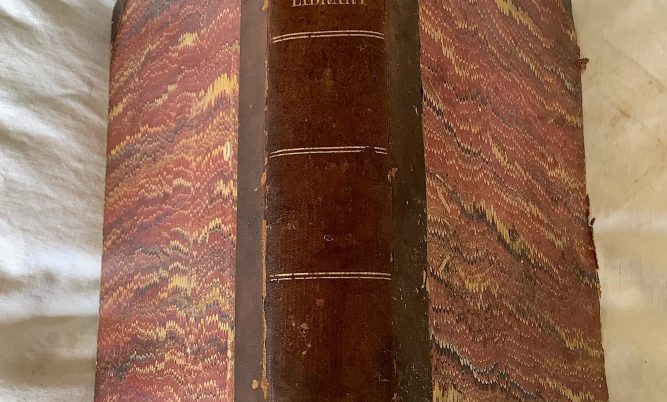Everyone knows how much I admire Elizabeth Fry and how she became a role model early on in my life. I shared her shyness, her fear of the dark, of death but not her terror of the sea which I adore. Although she was delicate, she worked hard, not for herself, but for others – women prisoners, the poor, the homeless, the illiterate – and endlessly she tackled the intricacies of her Quaker faith. As such, I am always grateful when someone gives me something relating to either Fry herself, her close family or friends, or the Religious Society of Friends.
I was delighted when Canadian friends sent me a beautiful and old Friends’ Library book published in Philadelphia in 1849 – four years after Fry’s death. Apart from the delightful cover, its title (The Friends’ Library comprising Journals, Doctrinal Treatises, & Other Writings of Members of the Religious Society of Friends) might seem a little dry and off-putting. But not to me! Exploring page after page – and there are 483 of them – I discovered history, intrigue, travel tales and religious views. The latter included thoughts on why Quakers refuse baptism and communion believing both should be spiritual. So, I thought I’d share a few of these stories here with you.
I read the words of Richard Davies who helped free the founder of Quakerism, George Fox from Worcester Prison. ‘In the latter end of the year 1674, I went to visit my ancient dear friend George Fox, who was a prisoner in Worcestershire. I passed through Herefordshire and had some meetings there.’ Fox was in prison for refusing the oath of allegiance – Quakers refuse to take oaths because they are expected to speak the truth at all times. Davies continued: ‘As he was opening [explaining] his case to me, I thought there might be sufficient errors found in his indictment to get him discharged.’ Long story short, Davies spoke to his friend Thomas Corbet in London and the case was reopened, they travelled to the capital and days later Fox was exonerated and set free.
Travelling was not as attractive as it might be today but many Quakers suffered the hardships and visited far and wide to share their faith. John Fothergill, born in Wensleydale in 1676, visited America on three occasions, including Antigua and Barbados, and travelled the length and breadth of Britain. On one of his visits to Dublin, he met William Edmundson, the first Quaker advocate in Ireland.
The Quakers always believed in the education and inclusion of women so, naturally, there are women’s diaries too. Mary Alexander, of Needham Market, who appears to have had a colourful life before becoming a Quaker, was friendly with Mary Gurney from Norwich. Hence another link to Fry who was also a Norfolk Gurney born on 21st May 1780.
Meanwhile, Margaret Lucas also lived an amazing life that the editor of her diary entry commented: ‘From the following lively specimen, it is to be regretted that no further documents are to be found…’ Indeed. Margaret was born on Fleet Street in London in 1701 where her father kept a china shop at the corner of Fetter Lane. She was the youngest of 14 children. Her mother died when Margaret was just 18 months old, so her father moved to Vauxhall and set up a potter’s yard. His second wife had two children before she died too. Then when Margaret was seven her father died, intestate, causing great problems for his large young family.
Going from relative to relative, Margaret moved from city to country gaining an education along the way including, at one point, singing lessons. In her late teens, she took over a shop with help from an uncle and pursued her path towards becoming a Quaker despite being mocked by all around her. For many years she suffered abuse, verbal and physical from her aunt. But she persevered and won them over to her Quaker state. At 24 she married Samuel Lucas and started a family of her own. All her life – she died in 1769 in Leek – she had objected to Quaker women speaking and becoming ministers. Gradually she overcame her prejudice and found peace in her faith. Fry, born 11 years later, became a minister and a regular speaker after battling and learning to control her shyness..
Another Quaker, Elizabeth Webb, describes her travels in America in 1697 sailing from Bristol to Virginia on her own. She was another brave woman overcoming her fears.
Who would have thought so much excitement could be contained in a book with such a deceptive title? Well we all know that one…books…covers…don’t be fooled!




